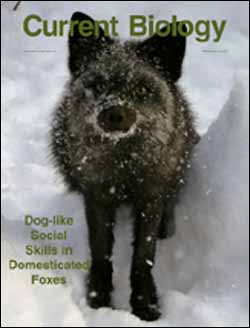Experimental domestication of foxes yields clues to cognitive evolution

New findings, made by researchers studying the outcome of a decades-long fox-breeding experiment, suggest that some aspects of social intelligence in animals are correlated with genetically selected “tame” behavior–for example, fearlessness and non-aggression toward humans. Understanding how intelligence evolved in humans and other animals remains one of the central evolutionary questions yet to be answered by behavioral scientists. Of particular interest is how social problem solving evolves; many believe it is our own social intelligence that differentiates us from all other species.
In the new work a team of researchers, led by Brian Hare of the Max Planck Institute, Leipzig, Germany, and colleagues at Harvard University and the Russian Academy of Science, have examined the effect of domestication on the social intelligence of foxes in order to address this question of how social problem solving evolves. Recently, it was found that during domestication dogs evolved an unusual ability to communicate with humans: dogs appear to be more skilled at reading human social cues than wolves and even non-human primates. However, it has remained unclear whether the evolution accompanying domestication in dogs occurred as a result of direct selection for communicative ability or instead as a correlated by-product of breeding selection against fear and aggression toward humans.
To better understand how dogs evolved their unusual social cognitive ability, the researchers studied an experimental population of foxes that have been bred in Siberia, Russia, over the last 45 years to exhibit, over generations, increasingly friendly behavior toward humans. After dozens of generations, these foxes now behave toward people much as pet dogs do–they even bark and wag their tails at the sight of a human. Critically, these foxes were not specifically selected during breeding for their social intelligence. However, the current study found that although the foxes were not intentionally selected to be more skillful at solving social problems, they are in fact just as skillful as domestic dogs at reading human social cues. The current study therefore suggests that social intelligence can increase simply as a result of an animal becoming less fearful and aggressive towards potential social partners.
Media Contact
All latest news from the category: Studies and Analyses
innovations-report maintains a wealth of in-depth studies and analyses from a variety of subject areas including business and finance, medicine and pharmacology, ecology and the environment, energy, communications and media, transportation, work, family and leisure.
Newest articles

Not Lost in Translation: AI Increases Sign Language Recognition Accuracy
Additional data can help differentiate subtle gestures, hand positions, facial expressions The Complexity of Sign Languages Sign languages have been developed by nations around the world to fit the local…

Breaking the Ice: Glacier Melting Alters Arctic Fjord Ecosystems
The regions of the Arctic are particularly vulnerable to climate change. However, there is a lack of comprehensive scientific information about the environmental changes there. Researchers from the Helmholtz Center…

Global Genetic Insights into Depression Across Ethnicities
New genetic risk factors for depression have been identified across all major global populations for the first time, allowing scientists to predict risk of depression regardless of ethnicity. The world’s…



